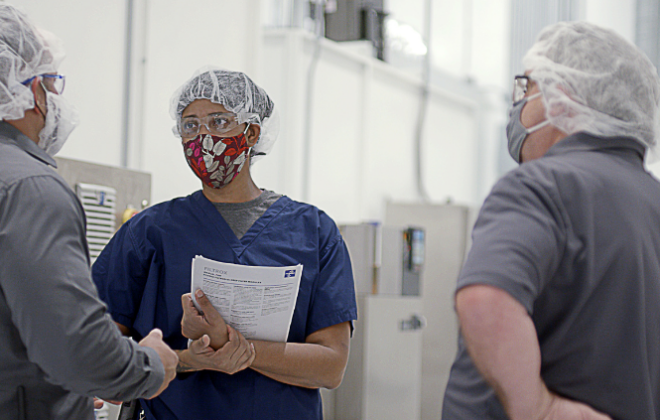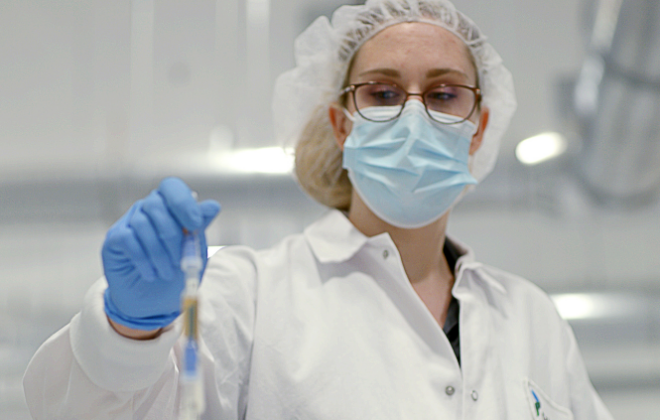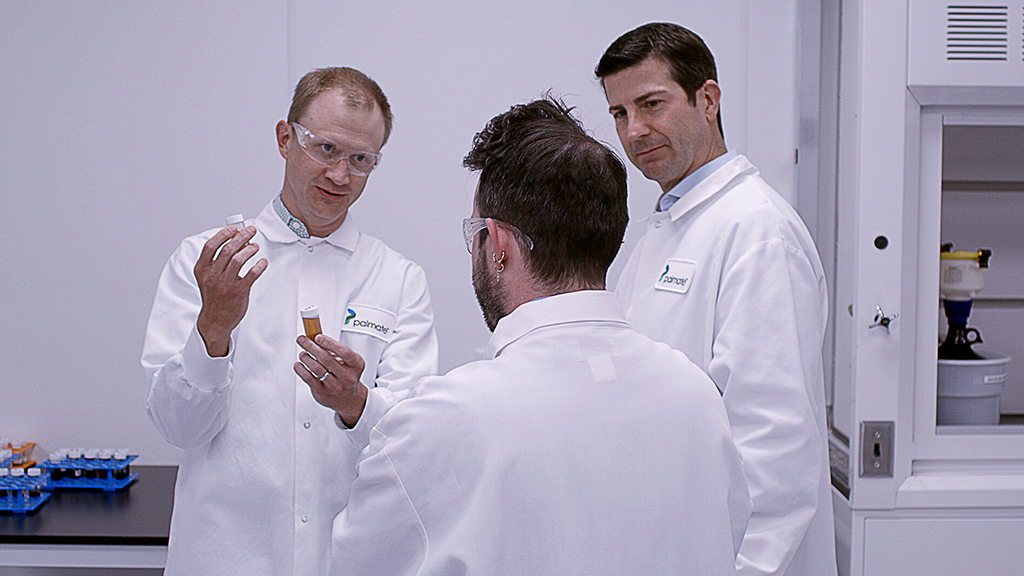
5 Ways Hemp, CBD, and Cannabinoid Companies Can Show Transparency in Their Practices
While the current regulatory state of hemp-derived cannabinoid products needs clarification, the Wild West phase persists. However, hemp processors who are committed to safety, quality, and consistency shouldn’t wait for the sheriff to ride into town. So, what can you start doing now?
Be transparent.
Here are five ways that companies making CBD/cannabinoid ingredients and finished products can establish a reputation for being open, honest, and straightforward—and make it clear that quality and safety are their highest priorities.
1. Register with the FDA
Although you’re not currently required to register with the FDA, CBD/cannabinoid companies who do are making a wise move. First, as an FDA-registered hemp processor, you’re signifying your commitment to maintaining an open and honest business. But that’s just the beginning.
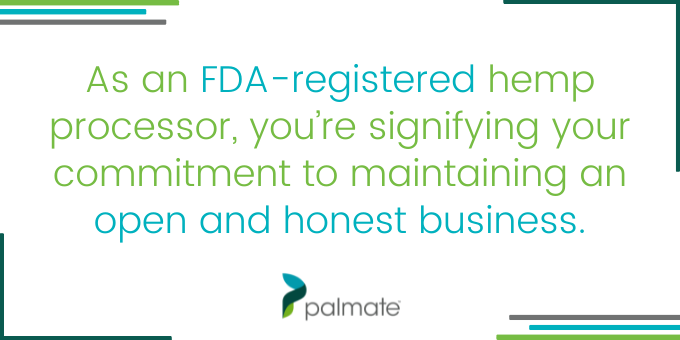
You’re also indicating you have the utmost confidence in your operations because you’re willing to open yourself up to the possibility of an unscheduled, unannounced FDA inspection.
That speaks volumes to the attention you’ve put on your internal safety protocols and your quality assurance program. (Of course, all of this assumes you will actually be prepared for that random FDA inspection.)
2. Be certified, not just “compliant”
Under the authority of the Federal Food, Drug, and Cosmetic Act, the FDA established Good Manufacturing Practices (GMPs) to ensure the safety of consumable products. This was later updated through the Food Safety Modernization Act (FSMA) to include robust risk analysis and preventive controls.
In short, a company adhering to GMPs under FSMA will be likely to maintain higher standards in its food safety management system. That’s why cannabinoid producers and formulators who want to demonstrate their commitment to food safety and quality should do more than claim they’re being “GMP compliant,” even if that claim is truly in good faith.

Verifying your adherence to GMPs should be done with GMP certification. This shows you’ve gone through an intensive evaluation from an authorized third-party auditor, who has, among other things:
- Reviewed your batch records
- Examined your extraction methods
- Inspected the integrity of your physical facility
Beyond GMP: Why a GFSI-recognized certification is the gold standard for safety and quality
Being GMP certified is a good start for demonstrating your commitment to safety and quality. But cannabinoid ingredients companies should do more.
Here at Palmate, we believe achieving the appropriate certifications—even if they’re not currently required—is the right thing to do. That’s why we’re not only GMP certified; we’re also certified with the Brand Reputation through Compliance (BRC) Global Standard.
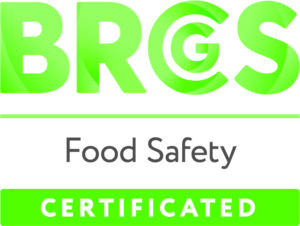
As a BRC-certified company, we’re one of just a few CBD/cannabinoid ingredient companies in the U.S. with a certification recognized by the Global Food Safety Initiative (GFSI)—and the only one in the state of Florida.
Most major retailers require products to meet GFSI standards, and we understand that CBD and other cannabinoid-infused products will be no different.

Palmate is also certified by the U.S. Hemp Authority. Our GMP, BRC, and USHA certifications not only show our commitment to raising industry standards for product safety and production quality; they demonstrate how our Food Safety Program delivers premium cannabinoid ingredients that adhere to the most stringent compliance standards.
Understanding key differences between GMP and BRC certifications
To understand some basic distinctions between GMP certification and GFSI-recognized BRC certification, consider the following:
- GMP certification verifies systems are in place, whereas a GFSI-recognized certification such as BRC has essentially validated that those systems are working.
- GMP certification has less rigorous supplier qualification standards compared to BRC standards.
- GMP certification shows that a company is audit-ready; BRC certification, on the other hand, goes a significant step further and confirms that a company has an established food safety culture.
- A GMP certification doesn’t necessarily include Hazard Analysis Critical Control Point (HACCP) certification; BRC certification essentially subsumes all basic GMP and HACCP standards.
3. Have an open-door policy with your customers
Official registrations, food safety certifications, third-party testing—these are important ways you can demonstrate a commitment to transparency. But there’s nothing like the simple act of saying to your customers, “You’re welcome here anytime.”—and really meaning it.
Make it clear that they have an open invitation to tour your facilities, examine your batch records, observe your production methods, and do whatever else they need to understand how you implement safety and quality standards for the ingredients you’re providing them.
4. Avoid unsubstantiated claims and aim for good science
Hemp processors can also demonstrate transparency not only by what they say and do but also by what they won’t say and do. Unfortunately, too many companies in the CBD sector today are making unverified claims of what CBD can do to relieve or “cure” various conditions and illnesses.
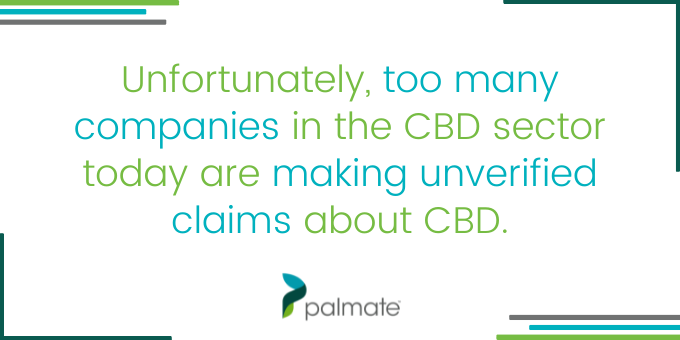
Rather than asserting untenable statements about CBD, hemp processors should focus on developing research partnerships that lead to substantive clinical evidence about a given ingredient’s efficacy.
Of course, not all research is created equal. Double-blind, peer-reviewed studies remain the gold standard for efficacy-focused research trials. Other forms of research involve fewer controls, but are still helpful for validating efficacy.
5. Act legally
Despite the current regulatory gray area, not all the lines that hemp processors work within are blurry. The Agriculture Improvement Act of 2018 (also known as The 2018 Farm Bill) exempted hemp and hemp-derived substances from the list of Schedule I drugs under the Controlled Substances Act.
That has made it legal to produce and consume hemp-derived CBD that contains less than 0.3% tetrahydrocannabinol (THC)—a major step forward for the hemp industry.
However, some processors are synthesizing Schedule I Controlled Substances like Delta-8 Tetrahydrocannabinol (aka “Delta-8”); the Farm Bill intended to legalize exactly one controlled substance: hemp.

Though there is more work to be done on the legislative front (and progress is being made), hemp processors should do all they can to contribute to—rather than jeopardize—the momentum that has already been established.
Take the initiative to elevate our industry
Our industry holds tremendous promise. Let’s all work together to elevate the stature of CBD. Hemp processors should make it their highest priority to work within the current legal framework, focus on producing safe, high-quality ingredients, and be as transparent as possible in the process.
Wondering how Palmate can provide cannabinoid ingredients that unleash the full potential of your products? A Palmate representative will be happy to talk with you.
Tags In
Recent Posts
- 7 Questions to Help You Find a Trustworthy CBD Ingredient Company
- Why CBD Companies Should Re-Examine Their Marketing Content—NOW
- Qualifying an Ingredient Supplier for Your CBD-Infused Beverage Products: 5 Crucial Questions to Ask
- The Logical Leap: 5 Reasons Why You Should Integrate CBD into Your Business
- GFSI-Recognized Certification: How Cannabinoid Ingredient Suppliers Can Help Manufacturers Succeed
Categories
- Best Practices (4)
- CBD and Business (3)
- Certifications (1)

